Psychoanalysis and Politics Conference 2019
COLONIAL FANTASIES, VIOLENT TRANSMISSION
SYMPOSIUM IN THE SWEDISH PSYCHOANALYTIC ASSOCIATION
MAY 10th-12th 2019
A report by Gabi Bonwitt
This Conference series on psychoanalysis and politics (
https://www.psa-pol.org), founded by Lene Auestadt from Norway, is a multi-disciplined project in which psychoanalysts and psychotherapists, journalists, sociologists, philosophers and cultural researchers come together each year. Its goal is to allow psychoanalytic observation on contemporary political events and processes and to learn how political events and psychoanalytic thinking can influence each other.
One of the basic assumptions of the Conferences is that psychoanalysis does not have the luxury to ‘shut itself up’ and should recognize the cultural and political influence that the external world has on it. As Hanna Segal said, psychoanalysts must keep their neutrality in the psychoanalytic setting and quit it when they leave the room.
Among others the following issues rose at this year’s Conference entitled “Colonial Fantasies - violent transmission”:
The relationship between white man and black man in the post-colonial world
There was a claim that some of the basic psychoanalytic assumptions are rooted deep inside the cultural and social constructions of the white man and are implied from them. For example, the concept of primitive thinking which describes a concrete, violent and sometimes psychotic thinking. It also relates to the way black people from Africa are described: savages, pagan, violent, undeveloped and cruel. The linkage is interesting and is based on the influence of colonialism on psychoanalytic thought, and its ethnocentric aspect. In this context, many mentioned Franz Fanon, who’s subversive and different position questions the validity of psychoanalytic thinking when it comes to the black man. He said that the oedipal conflict - a cornerstone in psychoanalysis - is not valid for the social and cultural constructs of the black man.
The neo-liberal world and the relationship between different aspects of human narcissism
It was explained and discussed how political leaders are using the human tendency to project "bad" aspects of others to gain political power. Do they use "backyards" of "inferior cultures" to deal with uncontained violent aspects of their societies?
The idea that ‘big data’ is a cornerstone in the technological revolution
It was illustrated how this idea is attacking subjectivity and meanwhile, is idealising efficiency and "objective" time. The result is painful solitude of everything that is linked with subjectivity and otherness. It has created an infrastructure for subtle racism and hatred of the other, hidden behind a postmodern and narcissistic world.
The Israeli-Palestinian conflict being introduced by both sides
The Israeli side was introduced by a paper on embracement zones that discussed architectural hints of post-traumatic events. The Palestinian side was introduced by a paper that described a professional relationship between an Israeli supervisor and a Palestinian therapist. They discussed a Palestinian patient that was humiliated by the Israeli army. Their claim was that they object any professional relationship between the oppressor and the oppressed. They stated that Each side must solve their own problems without involving the other side.
Using the ideas of Ferenzi
Identification with the aggressor as a sort of explanation of the present tendency of submission to the aggressor, in an attempt to fulfill the longing for a strong authoritarian leader, resulting in unconditional acceptance of their ideas and authority.
It was a fascinating and extremely interesting conference. With less than 50 participants in attendance, there was a really intimate atmosphere. The participants came from Brazil, Colombia, Zimbabwe, Norway, Sweden, Austria, Croatia, Palestine, Israel, Germany and the U.S.A and brought diverse political issues concerning their societies and countries.
It must be emphasized that the voice of psychoanalysis concerning political issues is getting weaker, even in France, which is known for the political voice of psychoanalysis. Psychoanalysis offers meta-theory on human nature and different political aspects is an integral part of human nature. One of the strongest voices that was heard during the conference was a call to get out of the ‘ivory tower’ and to meet cultural, social and political issues in a way that will enrich both our societies and the psychoanalytic world.
 Gabi Bonwitt, M.A., Training Psychoanalyst, Past Chairman, Scientific Committee, board of directors, the Israeli Psychoanalytic Society; Past Board Member and Director of Group Relations conferences, OFEK; "Testimonies", a documentary film, post trauma and soldiers (1994), Main Interviewer. He has a blog in "Hebrew Psychology", https://www.hebpsy.net/blog.asp?id=58
Gabi Bonwitt, M.A., Training Psychoanalyst, Past Chairman, Scientific Committee, board of directors, the Israeli Psychoanalytic Society; Past Board Member and Director of Group Relations conferences, OFEK; "Testimonies", a documentary film, post trauma and soldiers (1994), Main Interviewer. He has a blog in "Hebrew Psychology", https://www.hebpsy.net/blog.asp?id=58